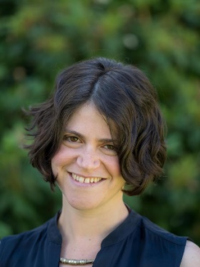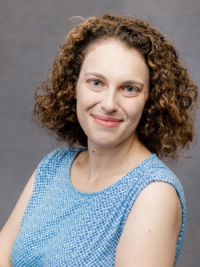Faculty Updates
New Hires
In Fall 2022, we welcomed four new faculty members: Harriet Fertik, Gaia Gianni, Christopher Parmenter, and Alan Ross.

Harriet Fertik (she/her) works on ancient political thought and classical reception studies, especially Black Classicisms. She is the author of The Ruler’s House: Contesting Power and Privacy in Julio-Claudian Rome (Johns Hopkins University Press, 2019) and co-editor of Above the Veil: Revisiting the Classicism of W. E. B. Du Bois, a special issue of the International Journal of the Classical Tradition (2019). Her forthcoming publications include a study of "women's work" and political participation in Aristotle, W. E. B. Du Bois, and Anna Julia Cooper, and an essay on antiquity, tradition, and anti-Blackness in Hannah Arendt's political thought. She is one of the founders of Eos (eosafricana.org), a society dedicated to Africana receptions of ancient Greece and Rome, and serves on its executive committee. She also co-organized the interdisciplinary conference “Mother’s Milk: Breastfeeding from Metaphor to Practice” (mothersmilkproject.com).

Gaia Gianni (she/her) works on Latin literature, Latin epigraphy and Roman social history. Her primary research interests are the development of fictive kinship in the Roman family, slavery and gender relations inside the household. She is currently working on her book, to be published by the University of Michigan Press, titled “Children in Ancient Rome: Social Relations and Familial Networks”. Dr. Gianni received her Ph.D. from Brown University and taught at Tulane University and the University of Alabama.

Christopher Stedman Parmenter (he/him) is an ancient historian specializing in the intertwined histories of race, culture, and long-distance trade in Archaic and Classical Greece. Before coming to Ohio State, I held postdocs at the University of Pennsylvania (2021-22) and New York University (2020-21), where I also received my doctorate in Classics. My book project, entitled Racialized Commodities: Long-distance Trade, Mobility, and the Making of Race in Ancient Greece, c. 700-300 BCE, asks how and why Greeks came to see their Mediterranean neighbors—like the “grey-eyed Thracians” and “dark-skinned Ethiopians” listed by the poet Xenophanes around 550 BCE—as racialized ‘Others’ in the middle of the first millennium. In 2021-22, I was a national lecturer for the Archaeological Institute of America. As a side project, I have written on migration, whiteness, and the racialization of the Armenian American diaspora for Ajam Media Collective.

Alan J. Ross (he/him) joined OSU in 2022. He received his BA from University College London, and MSt and DPhil from the University of Oxford. Prior to OSU, he held research and teaching positions at the University of KwaZulu-Natal (South Africa), University College Dublin (Ireland), University of Southampton (UK), Dartmouth College (USA), and Columbia University (USA). His research lies at the intersection of literary and historical studies in Late Antiquity. His first book, Ammianus’ Julian: Narrative and Genre in the Res Gestae (OUP, 2016), offered a narratological and intertextual study of the last great work of Latin historiography, and he has also published a number of articles on satire, hagiography, the novel, and epideictic oratory in the fourth century. His current book project focuses on Greek political rhetoric under the sons of Constantine.
Finally, this Fall 2023, we will welcome Benjamin Folit-Weinberg (he/him), who joins us from the University of Bristol. He received his Ph.D. from Cambridge in 2016 and specializes in Greek epic and pre-Socratic philosophy. Welcome, Benjamin!
Retirements
We have also seen a few faculty members retire since the last issue. In 2021, Bruce Heiden retired after 36 years at OSU. In 2022, Fritz Graf retired after 20 years at OSU and a prolific career. In April 2023, the department hosted a colloquium in honor of Fritz and his career. Congrats to Bruce and Fritz!
Awards
Professor Georgios Anagnostou was awarded the Vasiliki Karagiannaki Prize for the Best Edited Volume in Modern Greek Studies. Additionally, Professor Anagnostou was invited as a Walter Mangold Fellow at the University of Melbourne. This fall, he will give lectures at several universities and in Greek communities throughout Australia. Congratulations, Professor Anagnostou!
